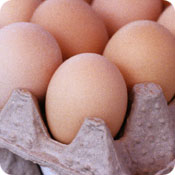
Quiz Time:
True or False?
Gelatin is an excellent source of protein and keeps your fingernails hard.
(Find the answer at the end of this article.)
Protein is a nutrient your body needs daily. Protein helps to build and repair body tissues such as your skin, muscles, organs, and even bones. It also forms enzymes and hormones that enable your body to function normally. In the form of antibodies, protein protects you from disease-carrying bacteria and viruses, and it's also a source of calories, providing 4 calories per gram. As with all foods, if you eat more protein than you need, the extra will be stored as fat.
The many different kinds of proteins in your body are all made up of building blocks called amino acids. The body connects these building blocks to form the specific protein that it needs. Nine amino acids are considered essential-- your body cannot make them, so your food choices must supply them. Their names may sound familiar: histidine, isoleucine, leucine, lysine, methionine, phenylalanine, threonine, tryptophan, and valine.
The other amino acids are non-essential-- your body can make them if you consume enough of the nine essential amino acids during the day. Believe it or not, a single cell of your body may contain 10,000 different proteins, each one requiring a different arrangement of amino acids.
Meat, fish, poultry, eggs, milk, cheese, yogurt and soybeans provide all nine essential amino acids. For this reason, they are considered high quality or complete proteins.
Plant sources of protein include legumes (dried beans, peas, and lentils), nuts, and seeds. Grain products such as barley, wheat, millet, rye, as well as many vegetables, have smaller amounts of protein. These plant sources are all incomplete proteins because they don't contain all the nine essential amino acids that the body needs.
Luckily, the essential amino acids present in one plant food can "connect" with the essential amino acids in another plant food to form a complete protein. This is the principle used to make a vegetarian diet. There is no need for combining specific foods at each meal, as once thought. Your body can make its own complete proteins if you eat a variety of plant foods and eat enough calories throughout the day. (For more on how to make sure you get all your important nutrients with a vegetarian diet, click here.)
The recommended protein intake for adults is 56 grams each day for a healthy male and 46 grams each day for a healthy female. But during pregnancy, that recommended intake increases to 71 grams of protein to handle the additional growth and development. Use the following steps to determine your specific protein needs:
Continued ›
| 

Member Comments